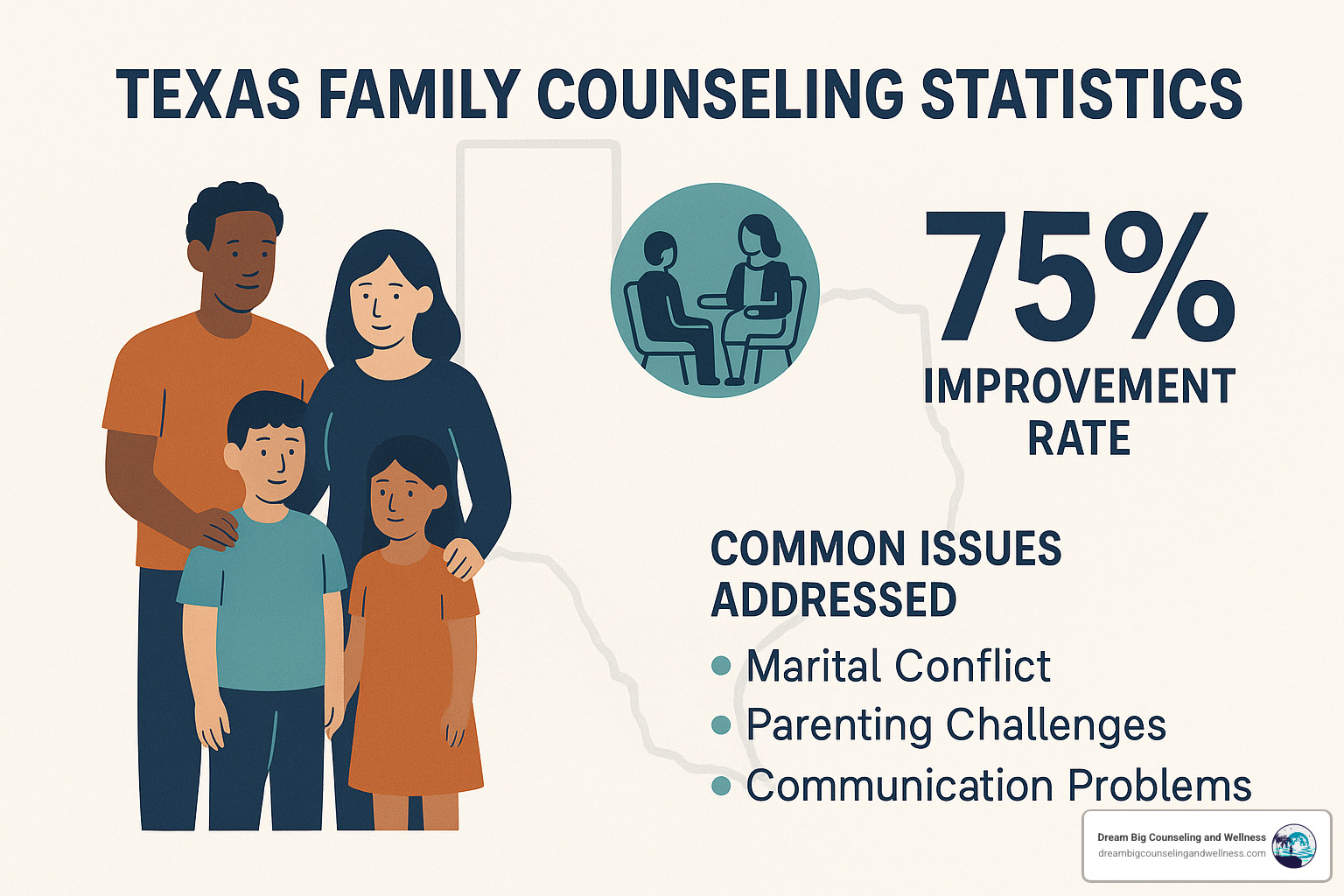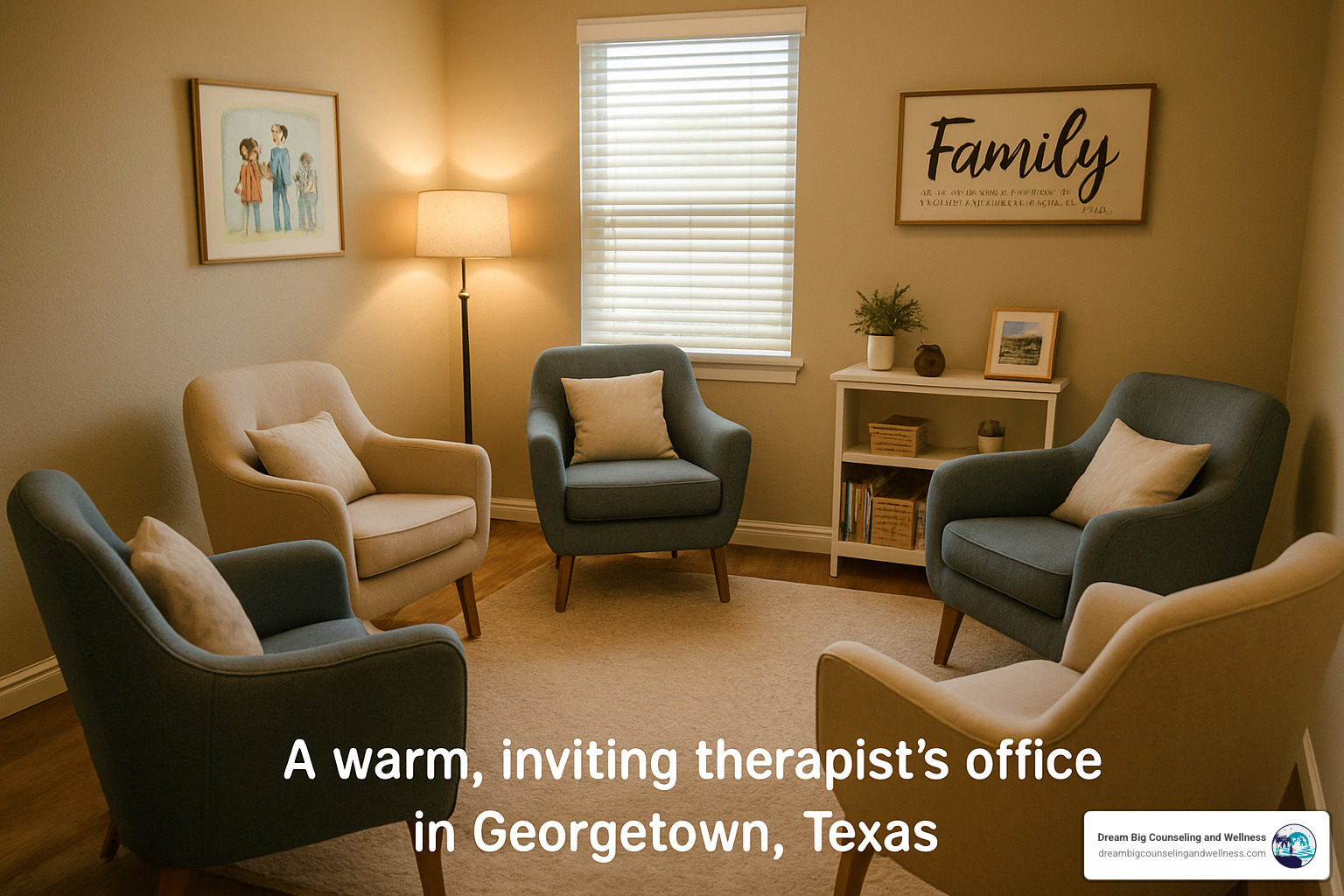Georgetown Family Counseling: Top 3 Powerful Benefits 2025
Why Georgetown Family Counseling Makes a Difference for Your Family’s Well-Being
Georgetown family counseling provides professional mental health services to help families navigate challenges, improve communication, and strengthen relationships through evidence-based therapeutic approaches. When family life feels overwhelming, seeking mental health care shows tremendous courage and commitment to your loved ones’ emotional well-being.
Georgetown Family Counseling at Dream Big Counseling and Wellness:
- Solo family therapist practice offering personalized, one-on-one attention for each family
- Insurance accepted: Aetna, Blue Cross Blue Shield, United Healthcare, Scott & White Health Plan, Cigna
- Ages served: Children, teens, and adults
- Available formats: In-person therapy in Georgetown, TX and online throughout Texas
- Specialties: Trauma, anxiety, depression, ADHD, addiction recovery
- Therapeutic approaches: EMDR, CBT, Attachment Therapy, Solution-Focused Therapy, Somatic Therapy, Safe & Sound Protocol, Reunification Therapy
Families in Georgetown, TX, Round Rock, Jarrell, Liberty Hill, and Cedar Park deserve mental health support that understands both the science of healthy relationships and the unique dynamics that make each family special.
Family life brings incredible joys alongside inevitable challenges. Between work demands, school schedules, and life stressors, even the strongest families can find themselves stuck in unhealthy patterns that create distance rather than connection. Perhaps your teenager has become withdrawn and uncommunicative. Maybe ongoing relationship issues between you and your partner are affecting the entire household atmosphere. Or perhaps everyone feels disconnected despite sharing the same living space.
These struggles don’t reflect failure as a family – they represent opportunities for personal growth and deeper connection. Research consistently shows that family therapy produces significant improvements, with studies reporting 70-90% effectiveness rates when families actively engage in the therapeutic process and develop coping skills.
Understanding Georgetown TX Family Therapy: A Collaborative Journey
Georgetown counseling functions as a collaborative journey where every voice matters and each family member gains tools for healthier connection. Unlike individual therapy that focuses on one person’s challenges, family therapy recognizes that families operate as interconnected systems where changes in one area create positive ripples throughout the entire family dynamic.
The process begins with a comprehensive assessment where your family shares current challenges, relationship patterns, and hopes for a more fulfilling life. This initial phase focuses on understanding your family’s unique strengths and identifying areas where growth can enhance overall mental wellness. The solo therapist approach ensures consistent mental health care from a professional who develops deep familiarity with your family’s specific dynamics and life goals.
Georgetown TX family therapy sessions occur in a warm, safe and supportive space designed to help every family member feel heard. The therapeutic environment operates on principles of respect, confidentiality, and non-judgment, creating conditions where authentic communication can flourish and families can explore their inner world together.
Both in-person counseling sessions at the Georgetown location and telehealth appointments throughout Texas provide flexibility that accommodates busy family schedules. This accessibility ensures that geographical constraints or scheduling conflicts don’t prevent your family from receiving the mental health services you need.
How Georgetown Family Therapy Sessions Work
Georgetown family therapy sessions are thoughtfully structured around your family’s specific needs and therapeutic goals. The solo family therapist model provides consistent, personalized attention from someone who truly understands your family’s story and develops familiarity with patterns that may need adjustment.
Each session begins with collaborative goal-setting that makes sense for your current situation. The client-centered approach emphasizes strength-based interventions, focusing on what your family already does well and building from those foundations rather than dwelling exclusively on problems.
Sessions may include the entire family working together, or sometimes focus on specific relationships within the family system to address particular patterns or concerns. Between sessions, families receive practical tools and strategies that help practice new ways of connecting and communicating in daily life while learning to develop coping skills for challenging moments.
The therapeutic approach respects each family member’s individual personality while working toward improved overall family functioning. This balanced focus ensures that personal growth occurs alongside relationship enhancement, helping each person work toward their best self.
Issues That Georgetown Counseling Addresses
When families feel stuck in negative cycles, it’s often because underlying patterns keep repeating without resolution. Georgetown counseling addresses root causes of these cycles, helping families break free from destructive dynamics and create healthier ways of relating to each other during life transitions and major life changes.
Communication Issues and Relationship Dynamics
Communication issues form the foundation of many family struggles. Conversations may consistently escalate into arguments before anyone realizes what happened, or family members may have stopped meaningful communication altogether, retreating into individual isolation rather than engaging with the family unit.
Family therapy teaches active listening skills, emotional expression techniques, and conflict resolution strategies that transform how family members interact during both calm and stressful moments. The family therapist helps families feel heard while developing healthy relationships built on mutual respect and understanding.
Recurring Conflict Patterns and Strained Relationships
Many families find themselves trapped in the same arguments repeatedly, with everyone knowing their roles but feeling powerless to change the script. These conflict cycles often mask deeper emotional needs that aren’t being addressed through surface-level disagreements, leading to strained relationships that affect the entire household.
Georgetown family counseling helps identify these patterns and provides alternative approaches to handling disagreements that lead to resolution rather than ongoing frustration.
Parenting Challenges and Life Adjustments
Parenting presents unique challenges at every developmental stage, from managing toddler behavior to navigating teenage independence and supporting young adults as they develop their own identity. Parents often feel overwhelmed by the responsibility while wanting to provide the best possible guidance for their children through various life adjustments.
Family therapy offers evidence-based parenting strategies while helping parents understand their child’s developmental needs and individual temperament. This support helps create more confidence in parenting decisions and more harmonious parent-child relationships that support each person’s emotional well-being.
Blended Family Dynamics and Life Transitions
Blended families face distinctive challenges when combining different family cultures, rules, and relationship patterns. These families require specialized support that honors everyone’s feelings while building new traditions and bonds that work for the newly formed family unit during major life transitions.
Trauma Impact on Families
Trauma affects entire family systems, not just the individual who experienced it directly. When one family member struggles with trauma symptoms like post-traumatic stress disorder or panic attacks, the emotional impact extends throughout the household, affecting relationships, daily routines, and overall family atmosphere.
Trauma-informed family counseling helps families understand these reactions and learn supportive responses that facilitate healing rather than inadvertently increasing distress. The family therapist works with families to develop coping skills and create a safe space for processing past experiences.
Mental Health Conditions and Self-Esteem
Mental health conditions like anxiety, depression, ADHD, and addiction impact the entire family constellation. These challenges affect daily functioning, relationship dynamics, and family roles in significant ways, often impacting self-esteem and overall mental wellness.
Georgetown family therapy provides education about mental health while teaching family members how to offer appropriate support without enabling unhealthy behaviors or taking on responsibilities that belong to the affected individual. The holistic approach recognizes how mental health affects the entire family system.
Life Transitions and Grief
Major life changes reshape family dynamics in profound ways. Whether adjusting to divorce, grieving the loss of a loved one, managing geographic moves, or navigating other significant life transitions, families often find their previous coping strategies no longer work effectively in helping them achieve a more fulfilling life.
Family counseling provides support during these transitions, helping families adapt their communication and support patterns to meet new circumstances while maintaining emotional connection and working toward their life goals.
Therapeutic Approaches Used in Georgetown TX Family Therapy
Dream Big Counseling and Wellness employs evidence-based therapeutic approaches specifically selected for their effectiveness in addressing family dynamics and individual mental health concerns. These methods are carefully chosen based on scientific research and proven success in helping families create lasting positive change while developing essential coping skills.
Cognitive-Behavioral Therapy (CBT)
CBT forms a cornerstone of family intervention, helping family members understand how thoughts, feelings, and behaviors connect in cycles that either support or undermine healthy relationships. This approach teaches practical skills for recognizing negative thought patterns and developing more helpful ways of interpreting family interactions.
CBT techniques help families break cycles of misunderstanding and reactivity by providing tools for clearer communication and more thoughtful responses during challenging moments. Families learn to solve problems together while building stronger emotional connections.
EMDR (Eye Movement Desensitization and Reprocessing)
For families dealing with trauma, EMDR offers powerful healing possibilities. Trauma creates lasting impacts that affect not only the individual who experienced it but also ripple through family relationships and daily functioning, sometimes contributing to panic attacks or other stress responses.
EMDR helps process traumatic memories so they lose their emotional intensity, allowing families to move forward without being controlled by past experiences. This therapeutic approach can significantly improve family dynamics when trauma has been a barrier to healthy connection.
Attachment Therapy
Attachment Therapy recognizes that strong emotional bonds between family members create the foundation for individual growth and family resilience. This approach focuses on rebuilding and strengthening the essential connections that help family members feel secure and valued.
Attachment-focused work helps families understand how early relationship experiences affect current family dynamics and provides strategies for creating more secure emotional bonds that support each person’s journey toward self-discovery.
Solution-Focused Therapy
Solution-focused therapy emphasizes practical optimism by identifying times when family interactions work well and expanding those successful patterns. Instead of analyzing problems extensively, this approach asks: “When does your family function at its best?” and builds on those existing strengths.
This therapeutic method helps families recognize their capabilities and develop confidence in their ability to handle challenges more effectively while working toward life goals that align with their values.
Somatic Therapy and Safe & Sound Protocol
Somatic approaches recognize that life stressors and trauma affect the nervous system in ways that impact how family members respond to each other. When family members feel emotionally overwhelmed, their nervous systems may react with fight, flight, or freeze responses that make healthy communication difficult.
Somatic Therapy and the Safe & Sound Protocol help family members learn nervous system regulation techniques that create the internal calm necessary for productive family interactions. These approaches are particularly helpful for families dealing with anxiety, trauma, or high-conflict dynamics.
Reunification Therapy
Some families need specialized support when relationships have become severely damaged or when separation has occurred due to conflict or other circumstances. Reunification therapy provides a structured, gradual approach to rebuilding trust and connection in these challenging situations.
This therapeutic approach requires careful planning and often involves working with different family members separately before bringing everyone together for joint sessions in a supportive space.
Marriage Counseling and Couples Support
While family therapy addresses the entire family system, some families also benefit from focused marriage counseling on the parental relationship. Strong partnerships between parents create stability that benefits the entire family, and marriage counseling can address specific relationship issues that affect the broader family dynamic.
The family therapist provides specialized support for couples seeking to strengthen their connection while maintaining their role as effective co-parents.
Creating a Safe and Supportive Space for Family Growth
Georgetown TX family therapy at Dream Big Counseling and Wellness prioritizes creating a compassionate space where every family member feels safe, respected, and genuinely heard. The therapeutic approach recognizes that meaningful change occurs when families feel supported rather than judged.
The solo therapist model offers unique advantages for families seeking consistent, personalized mental health care. Having one licensed marriage and family therapist who understands your family’s complete story means avoiding the confusion and frustration that can come from working with multiple providers who may not fully understand your family’s context.
Beginning therapy sessions are tailored to each family’s specific needs, cultural background, and goals. This individualized approach ensures that therapeutic interventions align with your family’s values while addressing the particular challenges you’re facing. New clients receive thorough orientation to help them feel comfortable and prepared for their therapeutic journey.
The therapeutic environment emphasizes collaboration rather than criticism. Families work together with their family therapist to identify goals, develop strategies, and celebrate progress along the way while building skills for stress management and emotional regulation.
Building Family Resilience in Georgetown TX
Resilience represents the foundation of family well-being, especially when facing significant challenges or major life changes. Georgetown family therapy focuses on developing family resilience by strengthening communication skills, improving conflict resolution abilities, and building emotional support systems within the family.
Every family member plays an important role in the healing process. Therapeutic work helps individuals identify their personal strengths while learning how those strengths contribute to overall family functioning. This dual focus on personal growth and family connection creates lasting positive change and helps families achieve a more fulfilling life together.
Resilience building involves developing practical coping skills that families can use long after counseling ends. These tools help families navigate future challenges with greater confidence and less destructive conflict while maintaining healthy relationships.
The family therapist provides guidance in developing these skills while recognizing that each family’s path to resilience looks different. Some families benefit from evening and weekend appointments to accommodate busy schedules and ensure consistent progress.
Starting Your Georgetown Family Therapy Journey
Taking the first step toward Georgetown counseling often feels both hopeful and anxiety-provoking. Dream Big Counseling and Wellness makes the initial process as welcoming and straightforward as possible for families ready to create positive change in their mental health and relationships.
Your journey begins with an initial consultation where you can share what’s happening in your family and learn about how family therapy might help address your specific concerns. This conversation provides an opportunity to ask questions and determine whether the therapeutic approach aligns with your family’s needs and values.
The solo therapist model offers significant advantages during this initial phase. Rather than navigating multiple providers, you’ll work with one dedicated family therapist who becomes deeply familiar with your family’s unique dynamics, history, and therapeutic goals.
Insurance and Accessibility
Dream Big Counseling and Wellness accepts most major insurance plans, including Aetna, Blue Cross Blue Shield, United Healthcare, Scott & White Health Plan, and Cigna. The intake process includes verifying your specific benefits and explaining any financial considerations clearly before beginning therapy.
Scheduling flexibility recognizes that family life doesn’t always accommodate traditional business hours. Evening and weekend appointments help families find sessions that work with work schedules, school commitments, and other family obligations.
Session Options for Georgetown TX Families
Both in-person therapy sessions at the Georgetown location and secure telehealth appointments throughout Texas provide flexibility that busy families appreciate. In-person counseling maintains face-to-face connection while online sessions offer convenience for families who face transportation challenges or scheduling conflicts.
Your first session focuses on getting to know your family and understanding what brought you to counseling. You’ll share background information about current challenges and discuss what you hope to achieve through the therapeutic process while feeling heard and supported.
The family therapist will walk alongside your family throughout the process, providing guidance and support as you develop new skills and strengthen your relationships.
Family Therapy vs. Marriage Counseling: Choosing the Right Approach
Understanding the difference between family therapy and marriage counseling helps families choose the most appropriate therapeutic approach for their specific situation. Both counseling services address relationship concerns, but they focus on different aspects of family functioning.
Family therapy makes sense when relationship issues affect the entire household or involve parent-child relationships, sibling conflicts, or whole-family communication patterns. This approach works best when problems ripple through multiple family relationships or when children are significantly impacted by family dynamics.
Marriage counseling focuses specifically on the romantic relationship between partners. This approach works well when conflicts remain primarily between spouses without significantly affecting children or when couples want to strengthen their partnership as a foundation for overall family well-being.
Who Participates in Georgetown TX Therapy Sessions
Family therapy sessions may include different combinations of family members depending on therapeutic goals. Sometimes entire families attend together, while other first session meetings might focus on specific relationships within the family system. Parents might also meet separately to develop consistent parenting strategies.
Marriage counseling typically involves just the romantic partners, concentrating on strengthening that specific relationship and improving communication between spouses while building healthy relationships that support the entire family.
Therapeutic Goals and Outcomes
Family therapy aims to improve how the entire family functions together. Families work on communication patterns that affect everyone, learn conflict resolution skills that benefit the whole household, and strengthen relationship dynamics across the family system while supporting each person’s journey toward their best self.
Marriage counseling concentrates on the romantic relationship itself, focusing on rebuilding intimacy, improving partnership communication, and resolving relationship issues that specifically affect the couple’s connection.
Sometimes families benefit from both approaches at different times or even simultaneously. The solo therapist model at Dream Big Counseling and Wellness offers advantages for families considering multiple therapeutic approaches, as having one licensed marriage and family therapist who understands your complete family picture ensures consistency and prevents conflicting therapeutic strategies.
Expected Outcomes and Benefits for Georgetown TX Families
Families who commit to the Georgetown family therapy process consistently report meaningful improvements that enhance daily life and long-term family well-being. While change takes time and effort, families often notice positive shifts relatively quickly once they begin implementing new communication and relationship strategies.
Improved Communication and Feeling Heard
Better communication typically represents one of the first noticeable changes. Family members learn to express their needs clearly while listening with genuine understanding. Parents find themselves actually hearing what their children are trying to communicate, while children feel heard and safer sharing their real feelings without fear of judgment or immediate consequences.
Enhanced Emotional Well-Being and Self-Discovery
When family members feel heard and understood, emotional regulation improves naturally. Parents develop skills for staying calm during their child’s emotional outbursts, while children learn healthier ways to express frustration instead of exploding or completely withdrawing. This process supports self-discovery and personal growth for each family member.
Stronger Family Bonds and Healthy Relationships
Therapeutic work that focuses on emotional connection and responsiveness strengthens family attachments. Family members learn to provide comfort during difficult times while still respecting individual needs for independence and personal space, creating healthy relationships that support everyone’s well-being.
Practical Stress Management and Coping Skills
Georgetown TX families gain concrete tools for handling disagreements that transform how they navigate conflicts. Instead of avoiding difficult topics or allowing arguments to escalate destructively, families develop coping skills for working through differences respectfully and productively while managing life stressors more effectively.
Increased Family Resilience and Mental Wellness
Family therapy builds resilience that helps families bounce back from challenges with greater strength and adaptability. When unexpected difficulties arise, families who have engaged in therapeutic work often handle these situations with more grace and less destructive conflict, supporting their overall mental wellness.
Long-Term Benefits for Mental Health
The benefits of family counseling extend far beyond immediate problem-solving. Children who experience family therapy often show improved academic performance, better peer relationships, and increased emotional stability. Parents report feeling more confident in their parenting abilities and more satisfied with their family relationships overall, contributing to a more fulfilling life for everyone.
Research demonstrates that families who complete counseling maintain their improvements over time, suggesting that the skills learned during therapy become permanent tools for handling future challenges and supporting mental health.
Frequently Asked Questions About Georgetown Family Therapy
What should we expect during our first Georgetown TX family therapy session?
Your first session focuses on getting to know your family and understanding what brought you to counseling. You’ll share background information about current challenges and discuss your hopes for therapy. The family therapist will explain their approach and answer any questions about the counseling process.
Beginning therapy can feel overwhelming, but come prepared to participate openly, even if some family members feel nervous about starting. Bring your insurance information and any intake paperwork provided during scheduling.
How long does Georgetown family therapy typically last?
The length of family therapy depends entirely on your family’s unique situation and goals. Some families addressing specific challenges might see significant progress in 8-12 sessions, while families working through complex dynamics or multiple issues may benefit from longer-term support.
Many Georgetown TX families find that intensive initial work followed by occasional check-in sessions provides optimal long-term results. Your family therapist will work with you to develop a treatment plan that makes sense for your specific needs and goals while supporting your journey toward a more fulfilling life.
Will insurance cover Georgetown family therapy services?
Insurance coverage varies by plan, but many Georgetown families find their therapy is covered when addressing mental health conditions. Dream Big Counseling and Wellness accepts most major insurance plans and handles verification of your specific benefits during the intake process.
Coverage typically applies when family therapy addresses diagnosable conditions or significantly impacts family functioning. Your family therapist can help determine whether your family’s situation meets insurance criteria for covered mental health services.
What makes Georgetown TX family therapy different from other counseling services?
Georgetown family therapy at Dream Big Counseling and Wellness offers personalized mental health care through a solo therapist practice. This means you’ll work with one dedicated family therapist who becomes deeply familiar with your family’s story, rather than navigating multiple providers.
The practice serves families throughout Georgetown, TX and surrounding communities including Round Rock, Jarrell, Liberty Hill, and Cedar Park, offering both in-person and telehealth appointments to accommodate your family’s needs.
Taking the Next Step for Your Georgetown TX Family
Georgetown family therapy represents more than professional mental health services—it’s an investment in your family’s future happiness and connection. When daily life feels overwhelming and relationships strain under pressure, seeking help demonstrates incredible wisdom and commitment to your loved ones’ emotional well-being.
The therapeutic approach at Dream Big Counseling and Wellness recognizes that every family has its own story, challenges, and unique strengths. Your family’s journey will be specifically tailored to honor your particular needs while building on the love and commitment that already exist within your family system, supporting each person’s path toward their best self.
Working with a solo family therapist practice offers consistent, personalized mental health care that larger organizations cannot match. You’ll develop a deep, ongoing relationship with someone who truly understands your family’s dynamics, history, and goals without the confusion of multiple providers or inconsistent treatment approaches.
Research consistently demonstrates that families who engage in family therapy experience remarkable improvements in communication, connection, and mutual support. Your decision to explore Georgetown counseling already shows your belief in your family’s potential to grow stronger together and create a more fulfilling life.
The path forward doesn’t have to feel uncertain or overwhelming. With appropriate mental health support, practical coping skills, and compassionate guidance, your family can develop the tools needed to handle whatever challenges life presents. Every family deserves to experience the peace and joy that comes from truly understanding and supporting each other while maintaining healthy relationships.
Contact Dream Big Counseling and Wellness today to learn more about how Georgetown family therapy can help your family thrive. Serving families in Georgetown, TX, Round Rock, Jarrell, Liberty Hill, Cedar Park, and throughout Texas via secure online sessions. Evening and weekend appointments available.






